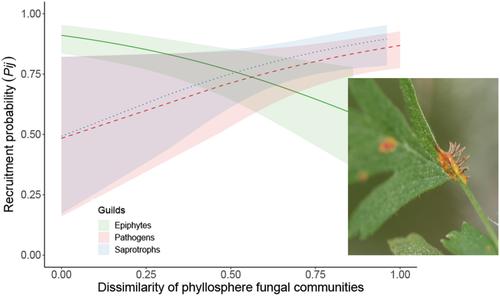Our official English website, www.x-mol.net, welcomes your feedback! (Note: you will need to create a separate account there.)
Mutualistic and antagonistic phyllosphere fungi contribute to plant recruitment in natural communities
Journal of Ecology ( IF 5.5 ) Pub Date : 2024-04-22 , DOI: 10.1111/1365-2745.14311 Mariona Pajares‐Murgó 1, 2 , José L. Garrido 3, 4 , Antonio J. Perea 1, 2 , Álvaro López‐García 1, 2, 3 , Jesús M. Bastida 3 , Julio M. Alcántara 1, 2
Phyllosphere fungal communities participate in multiple ecological functions (litter decomposition, disease‐causing, plant defence). However, there is a lack of knowledge on whether and how these functions contribute to plant community dynamics under natural conditions. One of the aspects of plant dynamics in which these fungi can most clearly affect is recruitment, since the success of newly germinated plants can be seriously compromised by pathogenic activity or the absence of mutualistic interactions. To determine the relationship between phyllosphere fungal communities and plant recruitment, we combined published information on the frequency of plant–plant recruitment interactions and phyllosphere fungal communities in 38 woody species from two mixed forests in southern Spain. Our results indicate that phyllosphere pathogens and saprotrophs have a negative effect on canopy–recruit interactions, while epiphytic fungi have a positive effect. Additionally, the presence of canopy species hosting high richness of epiphytes or counting with a high diversity of saprotrophic fungi favours the formation of an abundant sapling bank. Synthesis . Our results suggest that phyllosphere fungi play a relevant role in the assembly of the sapling bank in forest communities, thus, potentially influencing plant community dynamics. Beyond the well‐known negative effect of pathogenic fungi on recruitment, our results show the mutualistic effect of fungal epiphytes and a dual role of saprotrophs as antagonistic, decreasing recruitment of certain species, or mutualistic, enhancing recruitment in the sapling bank.
中文翻译:

互利和对抗的叶际真菌有助于自然群落中的植物补充
叶际真菌群落参与多种生态功能(凋落物分解、致病、植物防御)。然而,对于这些功能是否以及如何在自然条件下促进植物群落动态缺乏了解。 这些真菌最明显影响的植物动力学方面之一是补充,因为新发芽植物的成功可能会因致病活性或互利相互作用的缺乏而受到严重损害。 为了确定叶际真菌群落和植物补充之间的关系,我们结合了西班牙南部两个混交林的 38 种木本植物中植物补充相互作用频率和叶际真菌群落的已发表信息。 我们的结果表明,叶际病原体和腐生菌对冠层-新秀相互作用具有负面影响,而附生真菌则具有积极影响。 此外,拥有高度丰富的附生植物的冠层物种的存在或具有高度多样性的腐生真菌的存在有利于形成丰富的树苗库。 合成 。我们的结果表明,叶际真菌在森林群落树苗库的组装中发挥着相关作用,因此可能影响植物群落动态。除了众所周知的病原真菌对补充的负面影响之外,我们的结果还表明附生真菌的互利作用和腐生菌的双重作用,即拮抗,减少某些物种的补充,或互利,增强树苗库的补充。
更新日期:2024-04-22
Journal of Ecology ( IF 5.5 ) Pub Date : 2024-04-22 , DOI: 10.1111/1365-2745.14311 Mariona Pajares‐Murgó 1, 2 , José L. Garrido 3, 4 , Antonio J. Perea 1, 2 , Álvaro López‐García 1, 2, 3 , Jesús M. Bastida 3 , Julio M. Alcántara 1, 2
Affiliation

|
中文翻译:

互利和对抗的叶际真菌有助于自然群落中的植物补充



























 京公网安备 11010802027423号
京公网安备 11010802027423号